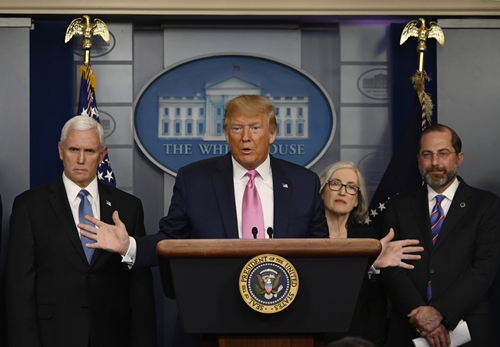
US President Donald Trump, flanked by Health and Human Services Secretary Alex Azar (right), US Vice President Mike Pence (left) and CDC Principal Deputy Director Anne Schuchat, holds a news conference on the COVID-19 outbreak at the White House on Wednesday. Trump defended his administration’s response to the novel coronavirus. Photo: AFP
Debate over the Chinese and Western political systems are never-ending, but in the wake of the coronavirus outbreak that has cost China and other countries dearly, some Western media outlets who are long critical about China's strict management of the epidemic, began to draw parallels between China's system, which they believe is a single-party state and authoritarian, and the Western system, which has an open structure allegedly with transparent information flow.A better system should be one that can effectively contain the virus and protect the lives of its people. However, the West continues to judge China's political system based on measures it has taken to contain the virus, but not the overall effectiveness of such measures.
But to what extent are the West's own disease control mechanisms effective? When a Florida resident with flu-like symptoms returned home from a trip to China, considering his own health and that of his country, admitted himself to hospital to conduct tests for the coronavirus, he ended up paying for a medical bill worth $1,400, and potentially more.
The US is not well prepared for a possible public health crisis. Even if it is, ordinary Americans will find it too expensive to go to the hospital to get treated. Shouldn't the US, the world's only super power, guarantee its citizens access to affordable and accessible health care?
Unfortunately, partisanship in the US, with US President Donald Trump's opposition to his predecessor Barack Obama's signature national healthcare plan as a notable example, is the very flaw in the US system that impedes the country's ability to deal with a public health crisis such as the COVID-19 epidemic. In an election year that is particularly important for politicians, Washington elites are putting their heads down into campaigns and political infighting, leaving a pivotal question to be asked, who cares about the health of individual voters?
Besides systematic flaws, other factors also contribute to the lack of preparation by the US. While doctors in California examined a woman infected with the coronavirus and immediately requested diagnostic testing from the Centers for Disease Control and Prevention, the procedure was not carried out because the case did not qualify under federal criteria - she had not travelled to China and didn't have close contact with anyone known to be infected. Although the issue was fixed later, the delayed diagnosis raised questions on whether the US can act quickly enough to control the spread of the virus.
The US media have barely mentioned their own system regarding control and prevention, but mainly focused on the issue from the medical and epidemic perspectives. But when they reported China's handling of the outbreak, they presented quite a different view by lambasting China's system.
Since the widespread coronavirus outbreak began, China has imposed strict measures nationwide, including the lockdown of Wuhan, the epicenter of the outbreak and other places, instituting quarantines, and the restriction of movement, which has effectively curbed the spread of the virus. Nonetheless, the Western media, especially in the US, pointed baseless accusations at China's measures and its so-called authoritarian system which they say curtails freedoms and violates human rights.
Experts from the World Health Organization have spoken highly of China's efforts in tackling the coronavirus outbreak and said the world should learn from China's experience and expertise. Now that the virus has rapidly spread to other parts of the world, democratic countries may also be baffled, having to choose between people's lives and national security, and their enchanted values.
It is time that countries who already have been hit by the virus to learn from China's experiences before being overwhelmed themselves. Criticizing China's system instead of reflecting upon its own certainly doesn't help.
The author is a reporter with the Global Times. wangwenwen@globaltimes.com.cn


